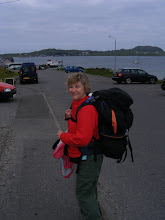It's true...Dawn DiPrince and I are cousins, more than twice removed, but cousins none-the-less. Dawn's great-great grandmother, Maria Antenucci, and my grandfather, Salvatore Antenucci were brother and sister. So, what does that have to do with Dr. Patricia Trujillo's rhetorical family tree? Everything!
Since this is to be our "most-in-depth, reflective blog for the course," I trust you will bear with me. When Michaela, Emily, and I formed our group and drew Dr. Patricia Trujillo as our professor, I was thrilled. Prior to this assignment, my only contact with Dr. Trujillo had been as a substitute for Dr. Eskew's class one night last fall semester. She had us read bell hooks's Feminism Is For Everybody which taught me more about the feminist movement than living through it! I also attended Dr. Trujillo's workshop at Rawlins Library during All Pueblo Reads. She spoke about ethnicity, food, and story, and I knew that night I wanted to get to know her better. Here was my opportunity.
I won't duplicate Emily's blog except to add that our group took this project seriously, had fun, and made important connections that strenghtened Dr. Trujillo's rhetorical relationship to major theorists such as Karl Marx. During our interviews with Dr. Trujillo, it became apparent she was more influenced by family and community than scholarship. I asked her which theorist was her strongest influence, and she said her strongest influence was the work of Gloria Anzaldua. That statement led to a lengthy discussion about migration, borders, diaspora, culture, ethnicity, and genealogy. In fact, Dr. Trujillo shared a story of her own heritage that seemed like something from a Hollywood movie script. Migration and memory are powerful for Dr. Trujillo. Culture, ethnicity, borders, place, and the Feminine have shaped her. And, will shape her students. Indeed, Dr. Trujillo predicted the next theory to emerge will be the theory of space, i.e. physical geography, location, and homelands of the past.
I had just finished a reading assignment in Dr. Eskew's class. Written by Susan Stanford Friedman, the essay "Migrations, Diasporas, and Borders" was of great interest to Dr. Trujillo as we shared some of the passages. Two weeks ago Friedman was mentioned in Linda's power point presentation in Dr. Souder's class.
I gave a presentation on Jean Franco for Dr. Eskew's class. A specialist in the comparative literature of Latin America, Dr. Franco is part of Dr. Trujillo's rhetorical family tree. And the connections don't stop there. Juan Morales is the director of my creative thesis and David Hume (my major rhetorician for power point presentation) shows up in his lineage.
Lineage is my connection to Dawn DiPrince just as Gloria Anzaldua is the connection for Dr. Trujillo. We are women impacted and linked through migration, borders, ethnicity, and second language. I was twenty-six when my great-aunt Maria Antenucci DiPrince died, and I never had a conversation with her. She didn't speak English. Yet, here Dawn and I sit at a university in an Master's English program.
Of all the compositionists we've read and studied this semester, Mina Pendo Shaughnessy is the one who stands out. I can now appreciate the pressure placed on my father as a speaker and writer of English as a second language. I really do get it. I think about our conversations with Dr. Trujillo and I get it. Growing up, I witnessed a community of Italian immigrants living and farming east of Pueblo and I get it. Theory has given me the framework to get it. Will my future writing be colored by these new interprative skills-absolutely!
Richard Enos's essay Recovering the Lost Art of Researching the History of Rhetoric states
"the route to understanding Greek literature was through Greek culture, and understanding that culture meant understanding the development of writing and its relationship to orality" (17). What I witnessed as a kid and young adult was all about culture, memory, and loss.
Dawn helps her students recover that memory when she teaches her memoir classes. In fact, I've been one of her pupils.
This rhetorical genealogy project was initially an oral history, if you will, followed by research of lineage. I traveled to my grandfather and his sister's village a few years ago but my research was not as successful. You see, I found family, but I didn't speak Italian. Those who left, those who stayed behind, the theory of space: physical geography, borders, language, place...all open to interpretation.
Subscribe to:
Post Comments (Atom)

I love this! Without knowing it, my blog talks about nearly the same thing! It was hard to NOT think about family while we worked on our rhetorical lineage. (This summer we must connect with Helen to record some more stories.)
ReplyDelete